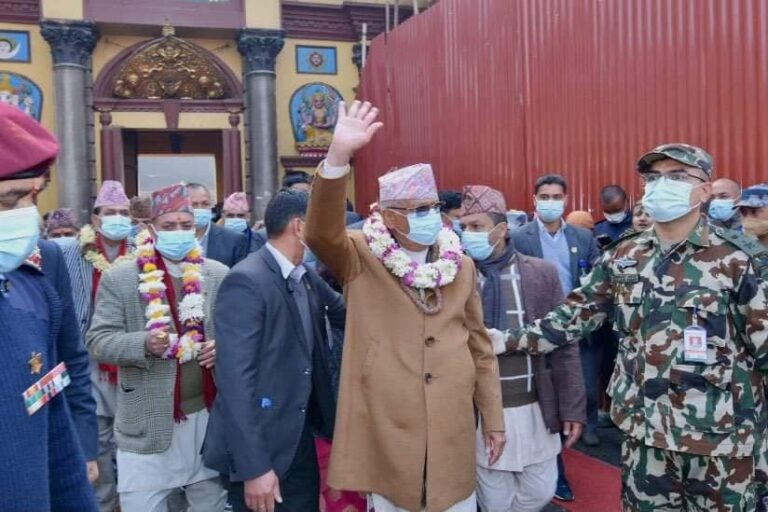
The governing and organizational style of not giving a hoot about anyone else’s opinion but of their own and punishing those who do not listen to them are some of the main characteristic of any medieval totalitarian emperor. Their intention to rule by order instead of law always eventually becomes evident.
The most natural aspiration of every authoritarian ruler who turns his back on the priorities of the people and the country is to be the ultimate godly leader.
Current caretaker prime minister of Nepal, KP Sharma Oli, has boldly displayed the above mentioned characteristics.
Oli’s intentions behind hosting a mass rally as a “show of strength” right in front of the Narayanhiti Palace Museum in Kathmandu on February 5 was not so subtle. During his speech to the mass gathered in his support, Prime Minister Oli had declared that his faction of the Nepal Communist Party (NCP) was the true communist power in the country and that the communist movement was now on the path of purification, in his leadership.
Twelve days before that, on Monday, Oli had spent hours at the Pashupatinath temple premises to worship for planetary peace. Oli, on the government’s behalf, also announced immediate release of Rs 300 million for the gold plating of the main Shivalinga inside the temple, on the roof of the temple and on the bull statue in front of the temple’s main entrance.
19th-century German philosopher Karl Marx, the founder and primary theorist of Marxism, viewed religion as “the soul of soulless conditions” or the “opium of the people”. In the Marxist–Leninist interpretation, all modern religions and churches are considered as “organs of bourgeois reaction” used for “the exploitation and the stupefaction of the working class”.
To exhibit his disdain for religion, Oli had eliminated the word God from his oath of office and secrecy both the times he was sown in as the country’s prime minister. The oath reads, “I pledge in the name of god and country to work for my country and its people with complete honesty, truth and sincerity”. But Oli had replaced the word god with citizens in his oath.
Now, as he poses as a true follower of Marxism while also being a practitioner of orthodox Hindu worship, Oli’s trickery and dishonesty are spilling as he mixes a concoction of Marxism and Hinduism.
Oli is neither an ideal follower of communist doctrine, nor an honest follower of Hindu rites, nor has he been able to transform into a true democrat who unconditionally believes in pluralism and civil liberties.
His mixture of Marxist Hindutva nationalism is just a crude political ‘stunt’ which is absolutely not what the national politics needs at the moment. His only objective – to confuse public sentiment for political purposes.
In his current political strategy, Oli undoubtedly takes inspiration from a certain neighboring leader whose intention to stay in power through regional geopolitical and religious hegemony has now grabbed international attention.
Oli, who pretends to be a Hindu and a patron of the Pashupatinath temple, is clearly intent on appeasing the leadership of India and its ruling Hindu nationalist Bharatiya Janata Party, which aims to declare India a Hindu nation.
At the same time, the Indian establishment considers it a great achievement to be able to turn Oli away from the Pushpa Kamal Dahal faction NCP, which is becoming extremely pro-China. Meanwhile, Oli sees the happiness of the Indian ruling party, especially the conservative faction, as conducive to his politics.
Moreover, his sudden keenness on Hinduism is also targeted at appeasing those within the country who are demanding reinstatement of Nepal’s erstwhile Hindu nation status.
The Oli-led government, which should be working on a war footing for the country’s top priorities of development, construction, epidemic control and economic recovery, has been playing such tactics of deception after failing to fulfill its responsibilities. He has all the free to spend on public entertainment.
All the while, democratic powers and voices are completely overshadowed in Nepal. The main opposition party, the Nepali Congress, which calls itself a democratic party, is slumbering. The appointment of some relatives and beneficiaries of the party’s key leaders in powerful positions under the watchful eye of Oli has made the entire Congress party like confused child.
Both the country and the party are paying the price for Nepali Congress’s inability to save the troubled democracy and realize that the nation is facing a serious political crisis.





